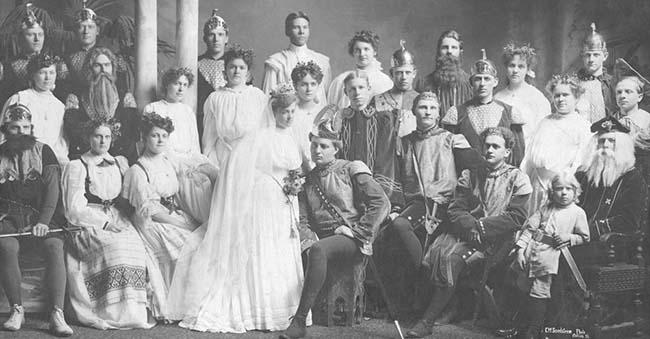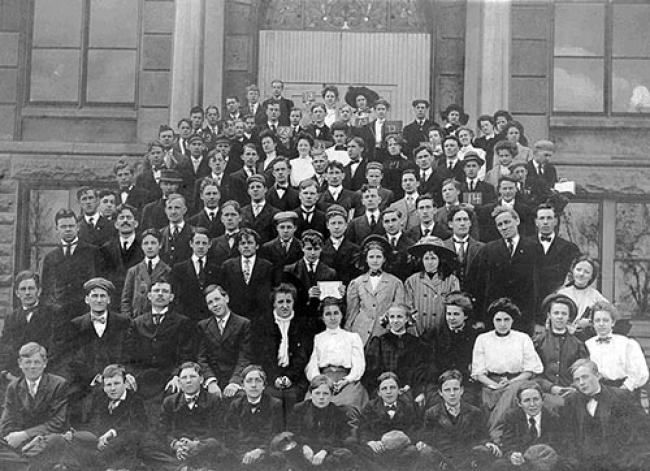"Entertainment" at Augustana: Then and now
(This story was written in celebration of Augustana's sesquicentennial in 2010.)
It's Friday night. What are your plans? You might go to Carver to cheer on the women's basketball team. Two of your friends are performing in the spring play; maybe you'll go see it tonight. Your fraternity friends invited you to an open party on 6th Ave. later on; should you stop by or just go straight out to The District?
Today's Augustana students have an almost overwhelming number of choices when it comes to social and entertainment opportunities. On any given night, you can choose to attend (or participate in) art exhibitions, musical performances, sporting events, or parties. If you don't want to go out, your options in your dorm room are equally vast: You might watch a movie, play video games, talk with friends in person, on your cell phone, or via text or IM.
A few of these options didn't even exist as recently as 10 years ago. As technology continues to develop, it leads to an ever-increasing number of ways to communicate and be entertained.

Meanwhile, the Office of Student Activities employs three full-time administrators and staff and works with countless students who coordinate and participate in more than 150 student groups and organizations, including Greek Life, the Multicultural Programming Board, and the College Union Board of Managers (CUBOM).
If you had been a student at Augustana in the mid-to-late 1800s, your options would have been much more limited. The school was established for the purpose "of educating young men for the ministry and for preparing young men for the profession of teaching." There were only male students and a much smaller number of them — only 90 in 1875 when Augustana officially moved to Rock Island — and the emphasis was on education, not entertainment.
The college's Lutheran roots also remained vitally important. Every student was expected to attend daily chapel service as well as Sunday worship. Not unexpectedly, then, many of Augustana's first student organizations were either religious or academic in nature.
Two organizations that combined academic interests with musical pursuits and prayer were the Phrenokosmian Society and the Adelphic Society, literary societies established in 1860 and 1882, respectively. Like modern student organizations, which often form to enable students with shared interests to meet regularly and plan activities, the societies offered students a means through which to explore their interests. These interests, however, were somewhat more formal than those of many student groups today.
The constitution of the Adelphic Society, for example, states that the group "desire[d] to conduct exercises in discussion, disputation, oratory, declamation, and music," while the Phrenokosmian Society wished to "promote a Christian life, literary improvement, and intellectual development among its members."
The groups met regularly to discuss business that remains typical for student organizations — membership, finances, etc. — but also to plan events (often called "entertainments") in which members presented orations, dialogues, debates, and musical performances.
In the college's earliest years, before the development of the school's musical and athletic programs, the weekly meetings and entertainments of the literary societies would have been among the only options for students seeking activities beyond the classroom and the chapel. Even so, their activities remained grounded in academics and intellectual pursuits.
By the early 1900s, as the student body grew in number and expanded to include women, students began to seek opportunities for social interaction beyond the formality and academic nature of the literary societies. Slowly, groups based on student interests beyond academics and religion formed and thrived, leading to the decline of the literary societies.

In the 1915 Rockety-I yearbook, the statement about the Phrenokosmian Society — written by the group itself — attests to students' waning interest: "Its meetings are scheduled for every Friday evenings, but of late it unhappily seems to have been relegated to the position of a ‘filler' for vacant Friday evenings..."
The statement by the Adelphic Society can be easily interpreted as an effort to recruit members, asserting that the literary societies are "a great and effective factor in raising the level of true culture among the students," even while acknowledging that "a literary society, like all good things, is not always the most popular organization."
Though the number of organizations available to Augustana College students in 2010 is vast, it also represents a balance among the many motivations students may have for coming together to form a group; groups exist for many reasons, which may be social, philanthropic, academic, musical, athletic, interest-based, or any combination of these. Though the literary societies declined, many groups — including national academic honor societies, departmental clubs, and professional organizations — still exist to enable students to explore their intellectual interests outside of the classroom. You can still start your Friday evening at a concert, play, or other "entertainment," but thanks to the evolution of student groups at Augie over the past 150 years, that will likely be just the beginning of your night.
— Anne Earel ‘01
Reference Librarian
